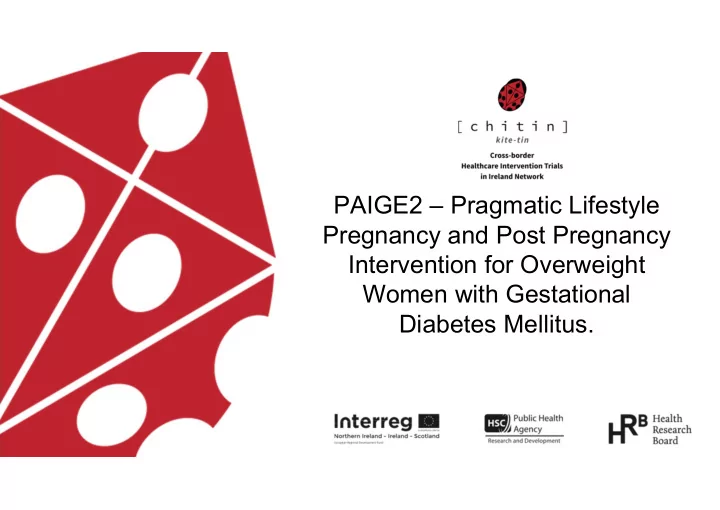

PAIGE2 – Pragmatic Lifestyle Pregnancy and Post Pregnancy Intervention for Overweight Women with Gestational Diabetes Mellitus.
Overview • What is GDM – why is it important? • The PAIGE study – what they did - what worked - what did they find out - what next • The PAIGE2 study • PAIGE2 & CHITIN • PAIGE2 & MLB
What is GDM? Gestational diabetes mellitus (GDM) is defined as glucose intolerance with onset or first recognition during pregnancy GDM develops during pregnancy, like other types of diabetes, it affects how your cells use sugar, which can lead to high blood sugar, this in turn can affect pregnancy outcomes for mother and infant. It’s not fully understood why some women develop gestational diabetes, however alterations in glucose metabolism are a normal physiological adaptation that occurs during pregnancy. During pregnancy, the placenta, which connects the fetus to the maternal blood supply, produces high levels of hormones. As the baby grows, the placenta produces more and more insulin-counteracting hormones.
Diagnosing GDM GDM is diagnosed by administering a 2-hour 75a g oral glucose tolerance test (OGTT). 2-hour 75g oral glucose tolerance test (OGTT) 1-hour plasma 2-hour plasma Fasting plasma glucose >10.0 glucose >8.5 glucose >5.1 mmol/L mmol/L mmol/L GDM GDM GDM
Screening – occurs between 24 and 28 weeks of gestation BMI>30 Previous Macrosomic GDM birth Risk factor for GDM Family Ethnicity history
Risks • Large for gestational age birthweight/macrosomia • Need for assisted delivery (Caesarean Section) • 50% more likely to develop GDM in future pregnancy • High risk of developing type 2 diabetes in the future • Childhood and adult obesity in offspring
Prevention Eat healthy foods. Choose foods high in fibre and low in fat and calories. Focus on fruits, vegetables and whole grains. Keep active. Exercising before and during pregnancy can help protect from developing gestational diabetes. Aim for 30 minutes of moderate activity on most days of the week. Take a brisk daily walk. Cycle. Swim. Lose excess pounds before pregnancy. Weight loss during pregnancy is not recommended. But for women planning to get pregnant, losing extra weight beforehand may help reduce the risk of developing GDM
PAIGE Background - GDM is associated with a 7-fold ↑ risk of type 2 diabetes High gestational weight gain and postpartum weight retention are established predictors of long-term obesity. Aim - To determine the impact of a postnatal lifestyle intervention program for overweight women with previous gestational diabetes mellitus (PAIGE).
Methods • Women with a BMI >25 & previous GDM were recruited at 6 weeks postpartum to participate in a multicenter randomized controlled trial • The intervention comprised of a 1-hour educational program, a free 3-month referral to a commercial weight management organization (Slimming World), a pedometer, and structured telephone and text p support, in addition to usual care. • The control group received standard care only. The primary outcome was weight loss at 6 months.
Results Sixty women were randomized (29 intervention; 31 control) in two centers. The intervention group demonstrated significant weight loss at 6 months after randomization compared with the control group: mean ± SD, 3.9 ±6 7.0 kg vs 0.7± 3.8 kg ( P = 0.02). With respect to well-being measures, bodily pain was significantly reduced in the intervention group ( P = 0.007).
Results
Results
Results
What worked? • Education session and accompanying booklet • Structured text and phone support • CMWO – for those who registered What didn’t? • Timing of recruitment • Pedometer • Lack of family support
PAIGE2 – Pragmatic Lifestyle Pregnancy and Post Pregnancy Intervention for Overweight Women with Gestational Diabetes Mellitus.
Screening Consent Questionnaires Blood Sample Randomisation Education session PAIGE2 Intervention 32-26 Control Standard Care 32-36 & Fitbit weeks gestation weeks gestation 6 weeks postpartum 6 weeks postpartum SW voucher Partner Anthropometric measures Anthropometric measures invited to join Blood sample Blood sample Questionnaires Questionnaires Text & phone support 6 Months postpartum 6 months postpartum Anthropometric measures Anthropometric measures Blood sample Blood sample Questionnaires Questionnaires Text & phone support 12 Months postpartum 12 months postpartum Anthropometric measures Anthropometric measures Blood sample Blood sample Questionnaires Questionnaires
Screening Consent Questionnaires Randomisation Blood sample Education session PAIGE2 Intervention 32-26 Control Standard Care 32-36 Fitbit weeks gestation weeks gestation 6 weeks postpartum 6 weeks postpartum SW voucher Partner Anthropometric measures Anthropometric measures invited to join Blood sample Blood sample Questionnaires Questionnaires Text & phone support 6 Months postpartum 6 months postpartum Anthropometric measures Anthropometric measures Blood sample Blood sample Questionnaires Questionnaires Text & phone support 12 Months postpartum 12 months postpartum Anthropometric measures Anthropometric measures Blood sample Blood sample Questionnaires Questionnaires
• Sligo University Hospital • Letterkenny University Hospital • Antrim Area Hospital • Ulster Hospital • Royal Victoria Hospital • Our Lady of Lourdes Hospital, Drogheda,
Making Life Better 2012–2023 is the ten-year public health strategic framework. The framework provides direction for policies and actions to improve the health and wellbeing of people in Northern Ireland. ‘Achieving a healthier Northern Ireland will hinge on what we do together, through policy and practice, to influence the key factors which impact on life chances and choices and ultimately on health and wellbeing’
Thank you to all our collaborators Dr Brid Farrell, Assistant Director of Service Development, PHA Dr. Adele Kennedy, Consultant Diabetologist, Antrim Area Hospital Dr. Ciara Mulligan, Consultant Endocrinologist, Ulster Hospital Dr. Tomas Ahern, Consultant Endocrinologist and Physician, Our Lady of Lourdes Hospital, Drogheda Professor Cathy McHugh, Consultant Endocrinologist, Sligo University Hospital Professor Fidelma Dunne, Consultant Endocrinologist, Letterkenny University Hospital
Thank you
Recommend
More recommend